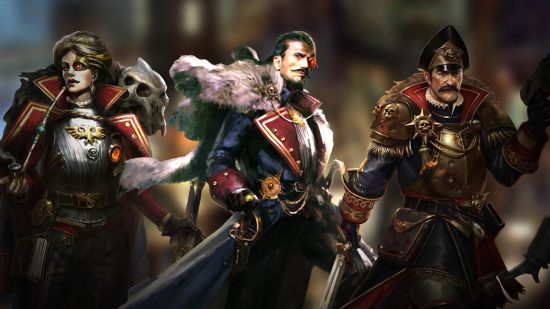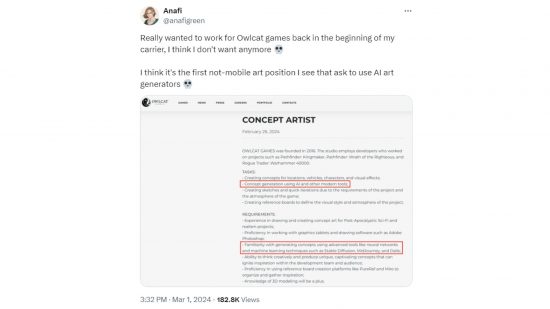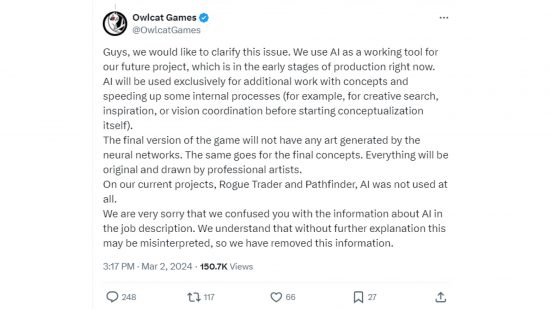On Saturday, March 2, Warhammer 40k Rogue Trader and Pathfinder video game developer Owlcat Games responded to a fan’s social media complaint about a concept artist job advert which, controversially, required applicants to have experience with AI art tools. According to the dev’s reply, the game connected to this role will not include any AI art in the final product, but this has not eased fans’ concerns.
The job, advertised on Owlcat’s website, is for a concept artist to work on an unannounced video game. Its listed tasks included “concept generation using AI and other modern tools” and referred specifically to AI art generators Dalle, Stable Diffusion, and Midjourney.
As for the game, no concrete details are given, but the job description suggests a post-apocalyptic setting. Given the studio’s recent history with titles like Warhammer 40k Rogue Trader, we’d expect it to be another cRPG.
Twitter user and concept artist anafigreen spotted the advert and called out the company in a post on March 1, saying this was the first role they’d seen outside of mobile gaming that openly advertised its use of AI art.
Owlcat soon responded, and attempted to “clarify this issue”. It suggested that AI would only be used in the early stages of the project, to speed up some internal processes. Specifically, it listed “creative search, inspiration, or vision coordination before starting conceptualization” as places where AI would be utilized.
The developer went on to clarify that the final version of the game would not include any AI work, and nor would its final concepts. “Everything will be original and drawn by professional artists,” the tweet stated. The company was also clear that the games it has already released do not include AI art.
As anyone familiar with the controversy around AI art would probably guess, this response did not placate fans one bit. Almost all of the 250 replies to Owlcat’s tweet were negative, as fans objected to the unapologetic use of AI art in any professional capacity.
Owlcat has now removed the offending segments from the job listing, which it says is to prevent them being misinterpreted. But this does not seem to imply that the job role itself will be changing.
Since AI art has exploded onto the scene, it’s been extremely controversial, with many objecting to its methods and the threat it seems to pose to the occupations of human artists. As a result there’s been strong social pressure, especially online, for companies to steer clear of the technology – which is what Owlcat just fell afoul of.
At Wargamer, we’ve most commonly encountered these controversies in the tabletop RPG world, where fans are hypervigilant for any use of AI (leading to some unfortunate mislabeling).
Since Pathfinder creator Paizo has not flinched away from condemning AI art, and Owlcat has created two Pathfinder games, one fan even suggested the company might be able to put some pressure on Owlcat. However, given the apocalyptic setting in the job ad, it seems unlikely this is a Pathfinder title, making it extremely unlikely the tabletop company would get involved.
Check out our Rogue Trader review here, to see what we thought of Owlcat’s Warhammer 40k game.


